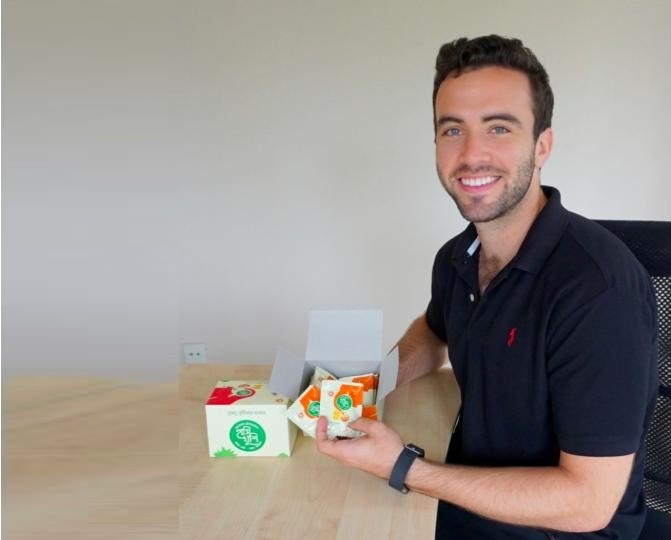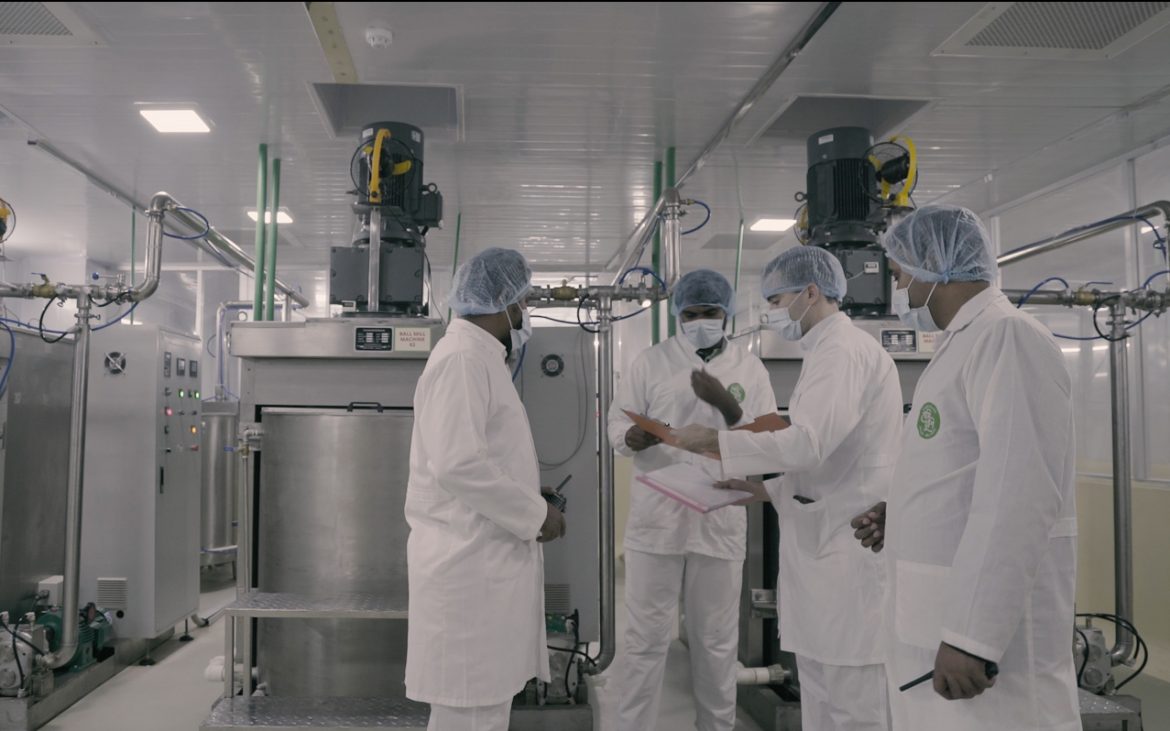
Frontier Nutrition CEO and co-founder Eddie Bearnot walks us through his early life, how his childhood and upbringing continue to shape his life and work, his path to what he is doing today, gives us a peek behind the scenes of Frontier Nutrition and much more.
Future Startup
Could you please tell us about your background i.e. your childhood, education, career, and your path to entrepreneurship?
Eddie Bearnot
I was born and raised in New York and went to college in Minnesota before coming to Bangladesh in 2012, where from 2013 to 2015 I helped start Direct Fresh. I returned to the US in 2015 to get my MBA at Yale University and to be closer to my family and friends after nearly 4 years away from home.
Future Startup
How has your childhood and upbringing shaped your work and worldview?
Eddie Bearnot
I’m the youngest of my parents’ three children, and my two older brothers are extraordinarily smart and successful. I think part of my desire to move across the world and build something from scratch comes from a need to prove to myself my own unique abilities.
I developed a thirst for adventure as a teenager. I started living and studying abroad for months at a time when I was 16, and later while in University. I quickly fell in love with how living in a foreign place can sharpen the senses, provide a sense of perspective, and make every day feel like a fun and rewarding challenge.
Future Startup
When and how did you get started with Frontier Nutrition? What motivated you to start Frontier Nutrition?
Eddie Bearnot
I started Frontier Nutrition in 2016, soon after returning to the US and entering graduate school. My dear friend and co-founder Tanveer Ali and I had often brainstormed ideas for projects we could work on together. With his experience helping grow his family's biscuit business and investing in many others, and my background in development economics, and recent experience helping to build a food distribution business from scratch, we put our heads together. We tried to identify commercial opportunities that also addressed the most pressing needs of the people of Bangladesh.
We decided that a lack of basic nutrition was a major risk to the future of Bangladesh. Despite rising income and increased consumption of snacks, millions of Bangladeshi families lack access to affordable and nutritious foods. As a result, nearly half of children and women suffer from malnutrition. This is the problem we set out to solve.
Future Startup
What went into building the initial operation of Frontier Nutrition? How did you put together initial investment and other things to get started? Please walk us through what the first few months to one year of Frontier Nutrition and your journey were like.
Eddie Bearnot
Tanveer and I started working on the product and business plan while I was in graduate school and starting pitching investors shortly thereafter. I took two trips to Bangladesh during my studies to conduct focus groups and field trials of our products, and to start recruiting our founding team.
Through connections provided by a Professor at Yale, we were able to bring on our first Angel investor, Shazi Visram, who had great success as a baby food entrepreneur in the US. With her mentorship and support, we were able to raise the first round of capital from the DSM Venturing, the VC arm of Royal DSM, a major multinational company. We closed the round a month before I graduated in May 2017, and on June 16th I was on a plane back to Bangladesh again.
Future Startup
What were some major challenges you faced in the early years and how did you deal with them?
Eddie Bearnot
The first set of major challenges we faced was related to building a factory from scratch, importing machinery, and setting up our clean room, production, and distribution facilities. While we faced many hurdles, we were able to complete construction and start making and shipping products within 7 months. We leaned on Tanveer’s expertise for this, as well as the support of several expert advisors in manufacturing, nutrition, and fortification.
The second set of challenges we faced were related to onboarding distributors and retailers and growing consumer awareness. We were--and still are--a new and relatively unknown company in Bangladesh. Having a well-known and trusted brand is essential to growing a business, especially in food. Our excellent quality products and unique value proposition have helped grow our brand, though there is certainly more work to be done here.
The final set of challenges had to do with building a team--identifying the right people at all levels of the organization, aligning them with our mission and strategy, and properly incentivizing them. The key here was to identify people with both significant relevant previous experience as well as a desire to be part of building something from the ground up. We have developed a series of exams, interview questions, and other protocols to help us improve recruitment and retention.

Future Startup
How did you grow Frontier Nutrition in the early days? How did you find your first set of customers and grow from there? What are some strategies and tactics you used in the early years/months?
Eddie Bearnot
We decided to use Khulna as a test market where we could experiment, learn, and make mistakes without irreversibly ruining our reputation or growing too quickly. We spent nearly 6 months refining our systems, resolving issues with quality and pricing, and finalizing our launch plan. This period of experimentation provided some of the key insights that we used to scale up and was a relatively low-cost and low-risk strategy.
We still turn to our team in Khulna to help pilot new products or strategies, and the region continues to be our largest market despite the presence in nearly 20 districts nationwide.
Future Startup
Could you please give us an overview of Frontier Nutrition today in terms of the products you offer, the number of users you have, your team, the size of your business, etc?
Eddie Bearnot
Our own branded portfolio of products currently contains 20 SKUs and is growing every month. Our products are available at ~20K outlets in ~20 districts around the country.
We are also working on partnerships with the Social Marketing Company (SMC) and the World Food Programme (WFP) to develop products to serve their customers and beneficiaries.
Between our headquarters, field force, and factory, we currently employ ~100 people.
Future Startup
How much has Frontier Nutrition evolved over the past years i.e. if you compare Frontier Nutrition today with Frontier Nutrition from the early days?
Eddie Bearnot
We realized early on that our core innovation -- fortified lentil butter -- would not be enough to sustain us. A great product is not the same thing as a great company.
To be both commercially viable and nutritionally impactful we needed to develop a range of products to meet the needs of the Bangladeshi consumer.
Future Startup
What are the plans for the future?
Eddie Bearnot
We have plans to increase our range of products and geographic distribution, expand our manufacturing capacity, and partner with other organizations to increase our reach, impact, and relevance.
Future Startup
What are the lessons you’ve learned in terms of growing a business? What other entrepreneurs can learn from your growth journey?
Eddie Bearnot
Pick the most important metrics for your success, measure them rigorously and religiously, spend time thinking about them carefully, and trust your conclusions. It is easy to let personal preference dictate strategy or to allow emotional attachment to make convenient excuses for poor performance.
Future Startup
How do you deal with the challenges and stress that come with being a founder?
Eddie Bearnot
Routine and community. Life as a founder is chaotic and uncertain. For me, a fixed daily routine helps me take back control.
I also schedule calls with friends and family several weeks in advance so that no matter what is going on day-to-day, I can stay connected and have something to look forward to. I find these relationships and conversations to be a great source of energy and inspiration.
Future Startup
How do you stay productive and positive as a founder and CEO? What does a typical day of yours look like?
Eddie Bearnot
As I mentioned before, routine and community are key to staying motivated, as well as regular exercise. I am up by 7 AM every morning. I take calls with stakeholders in the US until 8:30 and am at the office by 9 AM.
I spend at least two days a week at the factory or visiting field operations, and on those days will be out of the house by 7 AM to avoid traffic.
On days in the office, I am at my desk or taking meetings in person until 6 PM, when I pause from 6 PM and 9 PM to hit the gym, eat dinner, and call my family. I try to intentionally protect this time every day. It is easy to keep working, but the consequences for my mental health are very bad.
From 9 PM to midnight I finish up emails and other work from the day and try to read a few pages every night before heading to sleep.
Future Startup
5 books you would like to recommend to our readers.
Eddie Bearnot:
